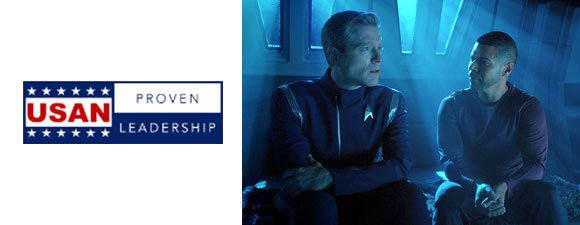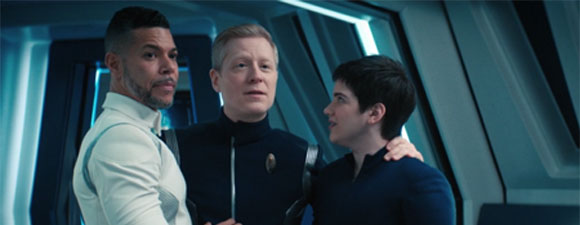Billingsley: Enterprise Gray Areas
2 min read
For Star Trek: Enterprise‘s John Billingsley, Star Trek: Enterprise episodes that dealt with serious issues were the better ones.
So when Dear Doctor came along, Billingsley was happy, and for more than one reason. “I figured it probably would be controversial,” he said. “I had, to be honest with you, two reactions to it.”
One of the reactions to Dear Doctor was a “selfish” one, said Billingsley. “…It was the first episode that actually featured me to any great extent and it was the first opportunity I had to, I felt, put a bit of a stamp on the guy. So I was primarily concerned as an actor about what I was going to do and less concerned with what the issues presented by the script were. But I had a feeling that probably there’d be some upset.”
Billingsley found the “issues episodes” the most compelling. “I definitely agree that, just for me personally, aesthetically speaking, the episodes over the arc of four years that I thought had the most impact and held the most interest for me were the ones that actually did deal with issues. The cloning episode (Similitude) in the third season was particularly good. There was an episode (Cogenitor) in which Trip interferes with a couple’s decision to use their quasi-servant as a person to breed for them. That was one that got people’s panties in a twist a little bit, and those are the kinds that are interesting.”
“[Dear Doctor] was dark,” said Billingsley. “It creeped people out: an entire race of people are going to be doomed to extinction. I rather liked the darkness of Enterprise when it chose to be dark. I always wondered, ‘Gee, what would Enterprise have been like if were a cable show?’ The fans might have rebelled. It might not have been what they wanted, but to me it would have been interesting.”
Billingsley is still acting, although the jobs are fewer. “Things were running pretty well for four or five years after Enterprise,” he said. “But as is doubtless the case with many character actors right now, I’m in my 50’s and there are fewer roles, and it’s a very, very tricky marketplace for a ton of reasons.” But Billingsley has just finished a Nikita episode and “I’m doing Southland this week,” he said.
When Billingsley is not acting, he enjoys reading and traveling.







Though Dear Doctor had terrible ethics and a continuing misunderstanding of what the word “evolution” means on display, certainly Billingsley’s performance was not the problem.
What did you consider the terrible ethics? And it’s been a while since I’ve seen that episode, what part of evolution did they get wrong?
They got every part of evolution wrong. Phlox sees that there is a genetic condition affecting some of the population of the one species, and decides that this means they are “meant” to die and the other species is “meant” to flourish…so he withholds the cure for the genetic condition from the first species?!? This is some kind of bizarre pseudo-religious belief mixed with an equally exotic form of racism, and this is claimed to be “evolution” in the episode. There is virtually nothing scientific in Phlox’s actions, conclusions, or use of the term “evolution.”
His medical ethics are insane (…by Earth standards, if you suggest there could be significant variation based on reason—I’m not so sure that is the case), but the episode was rewritten so Archer didn’t disagree at the end. Instead, Archer and the script eventually suggest that he’s right to withhold the treatment, and that this is the model situation that leads to the creation of the Prime Directive! Let’s get this straight: aliens launched a deep-space mission, specifically seeking aid from other spacefaring civilizations for a medical condition affecting much of their species. They find the Enterprise, and it takes them back to their world and offers to help. The Enterprise’s doctor comes up with a cure, but then that cure is withheld because giving it to the aliens would be “playing God.” And the logic here is…they would only have been deserving of medical treatment if—what? They had used a better drive to fly out into space to find the Enterprise? This is whacked-out, especially as after-the-fact justification, and even more so if we are meant to believe that it led to the establishment of Federation policy among such guidelines!
The episode’s a train wreck. But as previously stated, performances were not the issue. Writers who write scripts about “evolution” without having any idea what it means is not new in Trek (see “Threshold” for another classic example).
Well stated, and now I remember it more clearly and your summation is pretty spot on. People tend to think of TOS as campy and somehow “less than”, but the element of science fiction as a mirror to humanity was so much more adult and advanced in so many ways compared to a lot of what came from 1987 forward. Then again, there was Spock’s Brain… So it’s a mixed bag on both ends, but I totally agree with your comments.